Today’s article was written by Ernesto Rivera. Ernesto is a BJJ black belt based out of Atlanta and an active competitor all over the world. He was recently a part of the winning team of PGF season 7. You can follow him on Instagram or read more of his work on his blog on Medium.

We’d been in the desert for less than a day when a catastrophic knee break snapped us all into consciousness. I remember looking over at no one and saying something like “Why the fuck didn’t he just tap?” No time for questions now, we’re live, send the next one in.
Walking from Room 730 of The Orleans Hotel to the fighting venue takes 12 minutes on a normal day and 20 minutes on the last day. I made this walk twice a day for five days straight in the Vegas desert, where on regular nights, the fighting venue serves as an audio recording stage. Except for the week that Season 7 of the Professional Grappling Federation took place, that week, it was everything but.
I was one of 20 athletes invited or qualified into a five-day jiu-jitsu slaughterhouse. $100,000 in prize money up for grabs for the winning team, and another $20,000 for the best individual athlete.
The teams were spearheaded by four jiu-jitsu legends turned coaches, including the greatest jiu-jitsu fighter of all time. The legends picked teams in an auction-style draft, with each team receiving $10,000 fake auction dollars to bid on the 20 of us in a random order, each selecting five.
Everyone competes against all other athletes who are not on your team, except for one opponent per team whom you avoid. Allegedly at random. That’s three matches a day for four days straight, 12 matches total for those that would manage it, and few of us did.
Submission only would be our format. Make your opponent tap, or it’s a draw, and you both score nothing. Six points for a choke, three for a joint lock, and an extra point if you get it done in under one minute.
120 total matches across five days would decide the $100k winning team.
Just like in all show business, the show must always go on in Vegas, and so an alternate draft was held after the main one, with ten alternates drafted, two per team. The alternates were assigned the unenviable job of staying ready in case of injury to one of the 20 athletes — it took less than 60 seconds of the first match, on the very first day, for a catastrophic knee break to send the first alternate in.
We’re in for a hell of a ride.
To add madness to chaos, the top 8 individual athletes at the end of the team event entered an individual bracket to fight for that $20,000 on the fifth and final day.
That’s up to $40,000 any one person can and would win.
Professional Grappling Federation Season 7 is upon us.
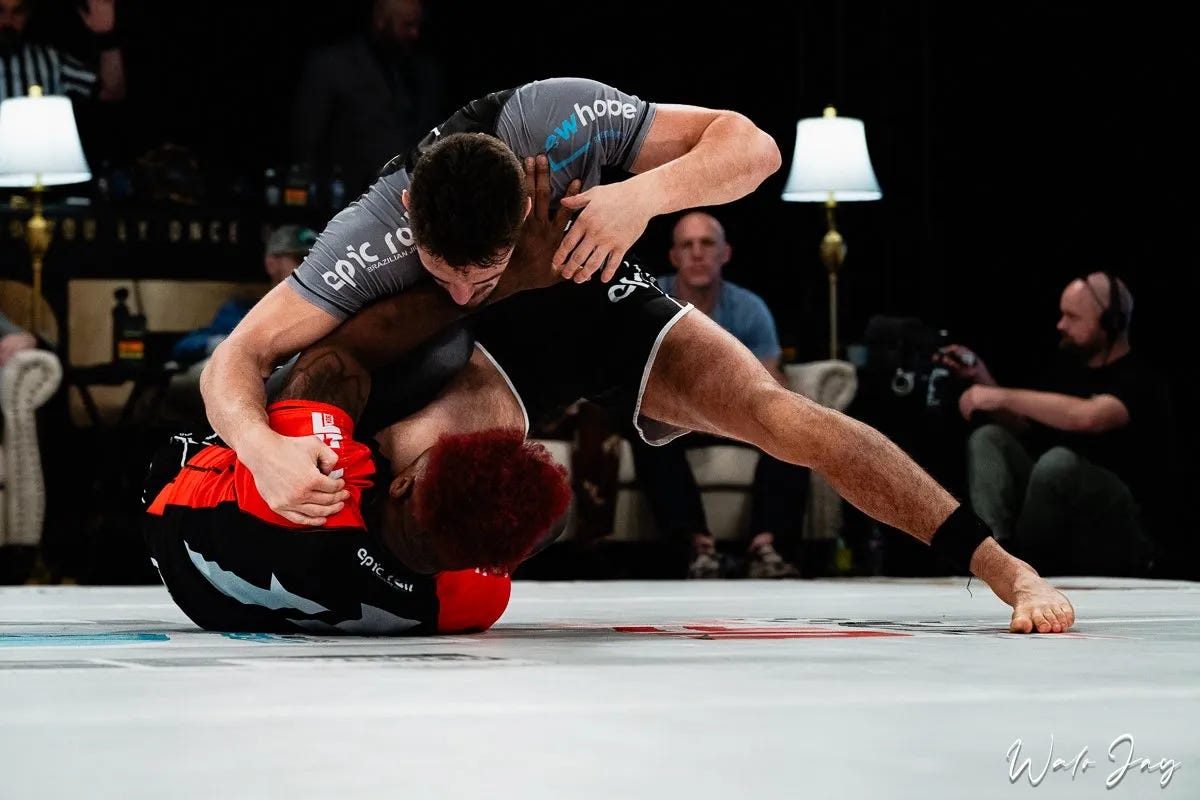
In early September, two months before I landed in Vegas, I was at the gym training because it was 7 PM on a Tuesday, and that’s what happens at 7 PM on Tuesdays. After the session, Paul asked me to record an interview video for him, I said yes without much thought and eventually got around to asking what it was for.
He told me he got invited to season seven of the PGF, which would take place at 205 pounds, a weight class he competes in, but I do not. I’d been dealing with a period of inactivity in competition since earlier in the year due mostly to injury, and I was generally itching for the chance to compete in something meaningful.
I asked him if there were any qualifiers for the event, knowing I’d rightfully have to earn my spot in a weight class 35 pounds heavier than what I usually compete in. He said yes, that it was on Saturday, four days away in Nashville. A short four-hour drive from Atlanta.
Fear of failure is never a reason not to do something. To only compete in events you think you have an advantage is a bully mentality, and so off I went.

Early Saturday morning, I got in the car with three close friends, Paul included, and we headed to Nashville. I avoid driving on days when I’m competing because driving requires decision-making, and regardless of how subconscious it feels, I like to make as few decisions as possible until it’s time to make the important ones that matter.
Driving to Nashville, I dealt with an intense feeling of imposter syndrome. Why do I think I belong in a weight class 35 pounds above my own? I thought about how three of my closest friends are dedicating their time to support my dream, and despite knowing they don't care about the result, the last thing I want to do is make it feel like a waste of time.
Deep down, I knew something that everyone else not in the car didn’t. Paul, who calling a family is closer to the truth than calling him a friend, is widely considered to be one of the best in the world at that weight, and the world doesn't train with him every day. I know he's even better than that.
I knew I’d done hundreds of training rounds with him in the gym over the past few years. This made it easier to ignore those thoughts.
The qualifier taking place at 205 pounds meant I wouldn’t have the usual weight cut to worry about, and so I weighed in at a laughable 189 pounds with jeans, shoes, a big Starbucks breakfast in my stomach, and probably a few coins in my pockets.
To abridge an otherwise grueling day, in the 31-man double elimination bracket I went 7–2, losing twice to the eventual winner and taking second place. Yes, it’s possible to lose and take second because the bracket was true second, meaning you have to win both the winners and the losers bracket. I fought my way back into the finals after losing my third match.
This meant I hadn't earned an outright spot on the PGF, but I’d earned myself an alternate spot, which felt fair enough. Besides the matches I lost to the winner, who’s a world-class guy who usually competes at around 220 pounds, I was fine with my performance.
Deep down this was enough of a result, I knew I’d be going to Vegas anyway to support Paul, so having an alternate spot meant I would at least have a chance of competing.
I had proved to myself I belonged, but this wasn’t enough. I wanted to show everyone, and myself, that I’m one of the best in the world, at any weight class.
After that day in September, I trained as if I’d be competing on the main roster, because I was hopeful the opportunity would come. It did.
Sitting at work in late October, four days before I was scheduled to fly to Vegas, I got news that someone from the main roster was out and called the organizer to ask if I was in. After a short back and forth, I was.
By the time the fighting started a few days later, I’d been drafted to a team that on paper looked like the worst team out of the four, by everyone's assessment, including my own. This was a combination of underestimating my teammates and myself.
I’d forgotten I was on the team, as it turns out, this would matter.
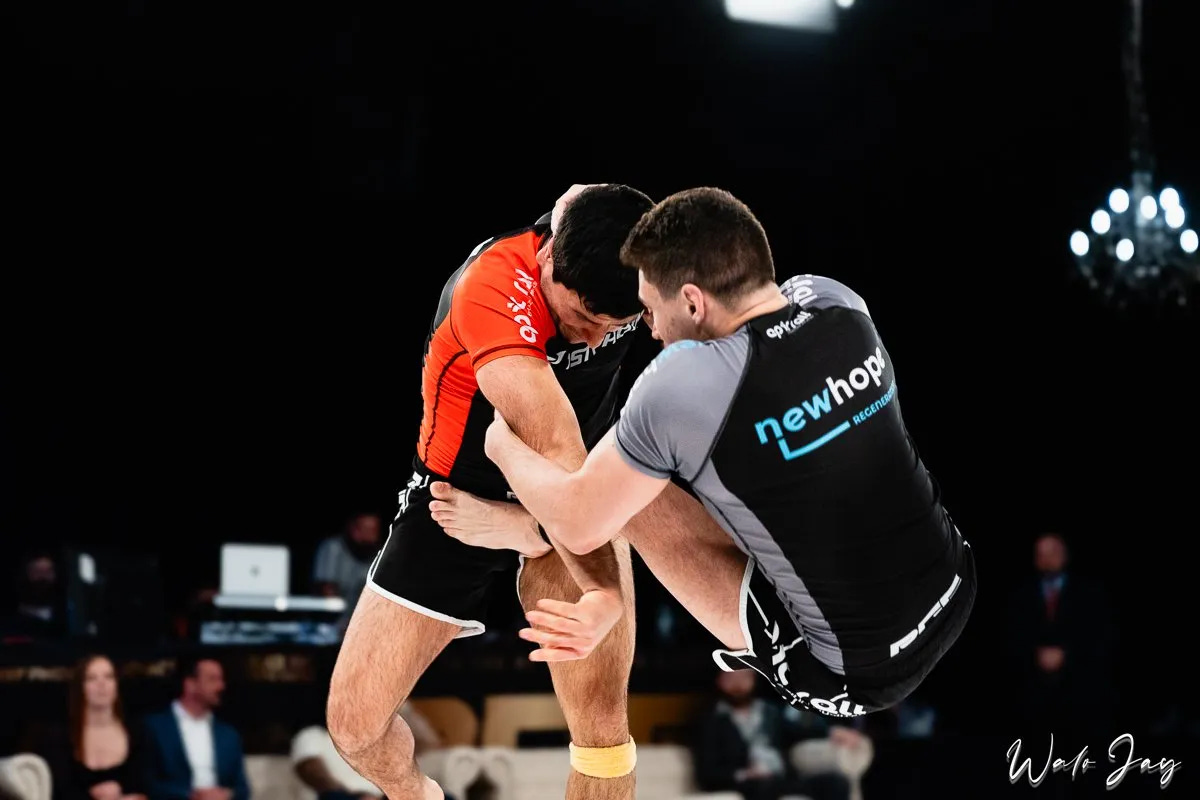
I’ve learned to deal with competition nerves over time, and today hardly struggle with them at all. At worst, I’ll reframe any nerves as excitement in my mind, and that solves the problem.
Regardless, the excitement you feel on the day of competition is amplified and can become exhausting, as it would be in any heightened state for long periods.
The usual curve of excitement — we will use the reframed feeling — on the day of competition usually looks like this:
From one to ten, with one being laying on the beach relaxing and ten being “Oh fuck I hope this guy doesn’t succeed at breaking my leg during this match, which happens to be his exact goal”, I spend most of the day around a 6. Then it climbs steadily, peaking at around a 9 before I start my warm-up, then it drops precipitously to a 3, and then finally, once the match starts, you’re too focused on doing the thing to worry about how you feel, so I’m back at 1.
In tournaments with more than one match in a day, it usually stays pretty low even though you have to compete again because you got the first one out of the way.
Crucially, at the end of the day, you get to relax.
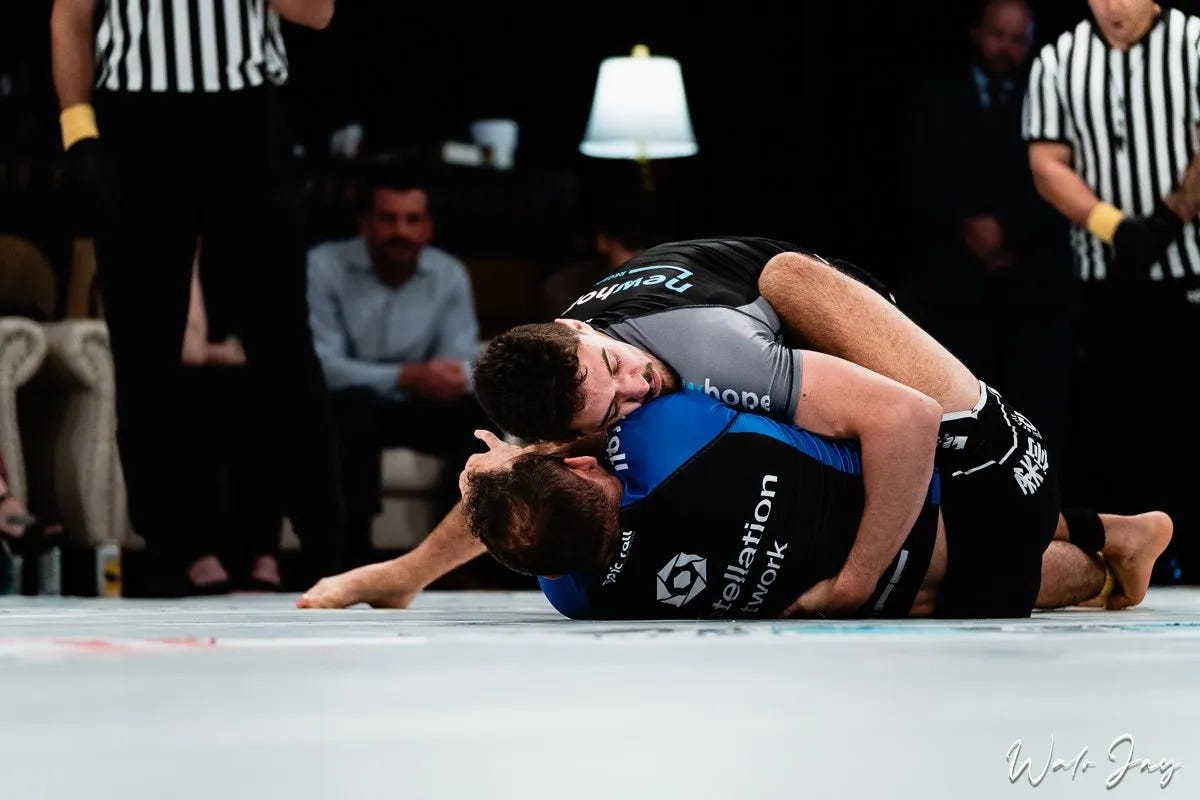
Here’s how a day went during the PGF for me.
6 AM: Wake up to start working by 9 EST time. I have a regular nine-to-five job on the East Coast where I live, so the show must go on there too — regardless of any fighting going on in the desert. Excitement level: 3
10 AM: Get breakfast at the terrible hotel cafe. Excitement level: 4
Noon: Walk the 12 minutes to the venue for our team practice and strategy session. Excitement level: 5
1 PM: Walk back, by now it takes slightly longer. Realize I haven’t eaten nearly enough all day and I’m already undersized for this tournament. I compete in a few hours. Excitement level: 7
Work some more until 2 PM. At which point it’s 5 PM on the east coast.
3 PM: Walk back to the venue, report time is between 3 and 4 PM, I wish they’d stop changing it on us. Excitement level: 9
4 PM to 10 PM: Warm-up, compete, cool down. Repeat 3 times for the three matches of the day. Excitement level: 3
10:30 PM: I’ve been hit by a bus, time to find food that won’t give me food poisoning, and that is as calorie-dense as possible. Mexican food truck it is. Excitement level: 1
11:30 PM: Back at the hotel, shower, and realize I have to do it all again tomorrow. Excitement level: 3
12:30 AM: On my phone looking at the next day’s matches, maybe studying tape. I have to be up in less than 6 hours, yikes. Excitement level: 4
Repeat for five days straight.
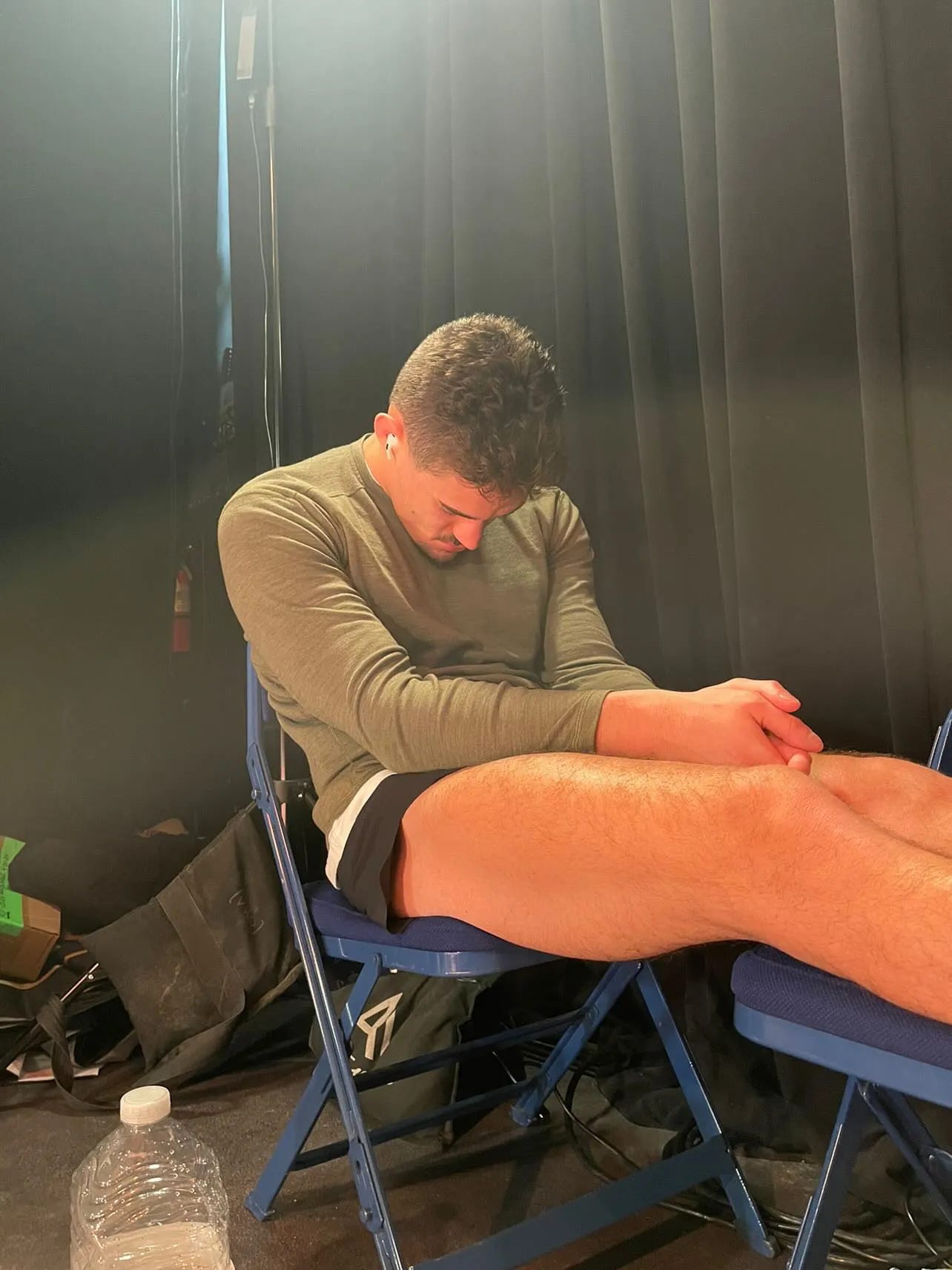
Déjà vu is the best way to describe what the week was for me. By Thursday I was unsure if I’d entered a Borgesque universe where instead of indefinite hexagonal galleries my world was comprised of an old hotel and a strange audio-visual recording studio that I couldn’t escape from — The Library of BJJ.
By the time the draft was over Sunday night, our team was not favored to win by anyone, including us. We would’ve been dead last if Vegas posted odds.
After our first team practice on Monday, everyone on the team realized we had an advantage no one else had, or rather two advantages.
Every team had a jiu-jitsu legend turned coach leading the way, but it quickly became apparent we had something different in Pedro Sauer and his long-time black belt Ricky Lundell, who served as assistant coach.
From the first practice on Monday, Ricky kicked us off explaining that it wasn’t about competing and winning— though he assured us we would — but it was about how we would do it. Always with gratitude for the opportunity.
It set the tone for excellence.
They followed with in-depth strategies, a technical review of common positions we’d be likely to encounter, and a total open exchange of ideas. Watching Pedro show and execute high-level techniques well into his 60s was nothing short of incredible.
By the second day, we were actively using techniques we had just learned from him the day before to escape submissions and decide matches.
Before each match, Pedro and Ricky would pull us aside, and it felt like they always knew what to say. Again after each match, win lose or draw, they would debrief with us. Simple reminders to stay off social media, or making sure we kept our heads together when a match didn’t go our way.
It was clear they were as prepared as coaches as we were as athletes, and it showed in the results.
By the end of day one our team was leading by a modest two points. Despite this, it felt like a huge win since we were favored by no one including ourselves.
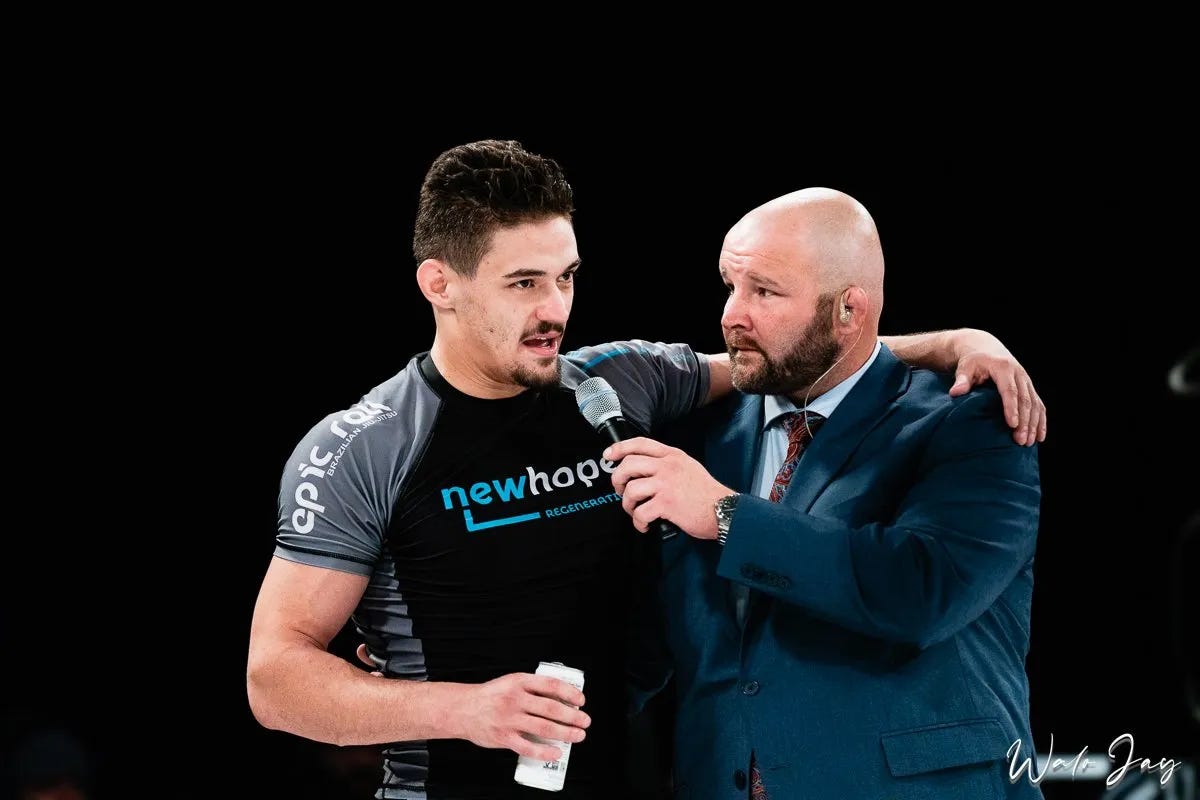
After the first day, Paul and I had one submission each, and we’d both enter day two in the top eight for the individual rankings. I’d dominated an easier lineup than he had, but still felt like I should’ve had three submissions, having ended two matches on my opponent’s back feeling like the finish was near. Despite the tougher first-day lineup, Paul felt (rightfully I thought) that he could’ve also come away with at least two submissions.
Despite being on different teams, we’re very much on the same team. We would coach each other during matches as we have for years, and even though we refrained from coaching when the other was competing against our own team, I knew he was rooting for me like I was rooting for him. The silence was strictly optical.
After the first day, we left the venue, drove to the nearest Mexican taco truck, and then headed back to the hotel room we were sharing for the week. This is the same routine we’d follow for the next four days, living in that Borgesque universe together.
One day and three matches down for each of us, three more days and nine more matches to go.
The only match that would be different was our first one the next day. Each other.
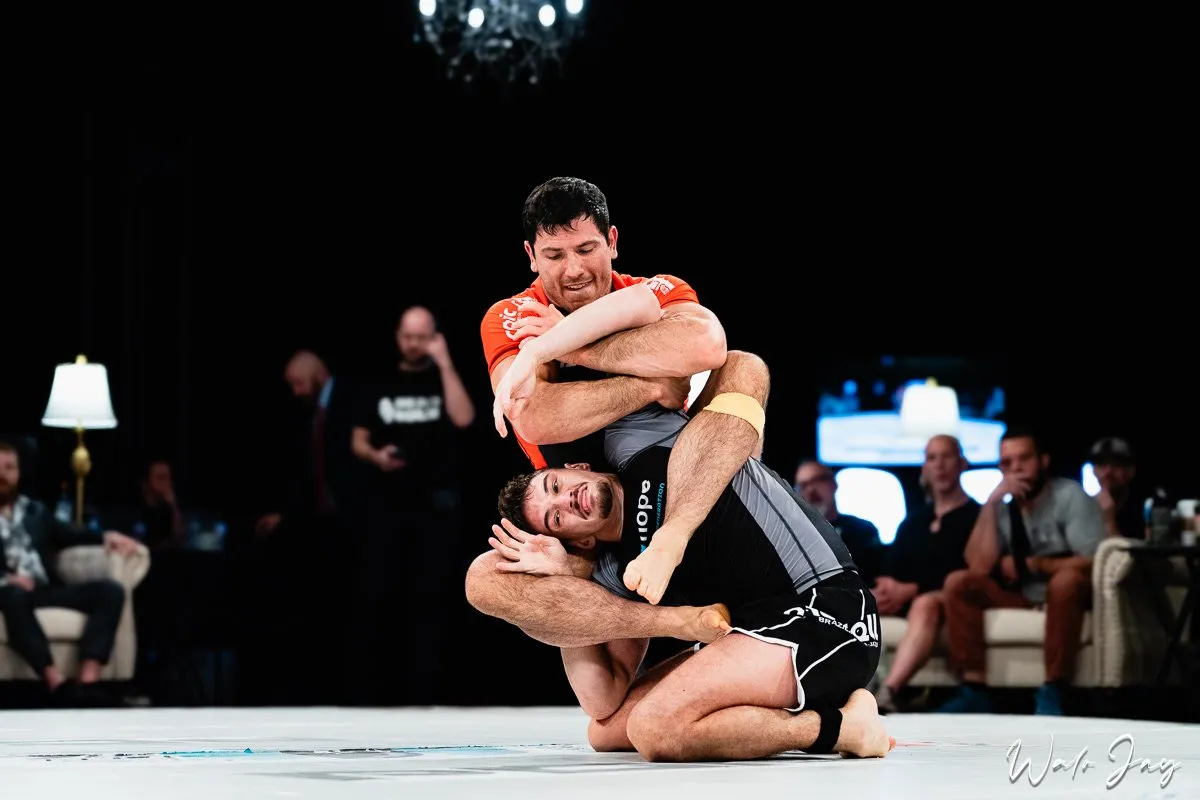
You’d incorrectly assume this made the shared hotel room or the car rides, or the meals, awkward and uncomfortable. It was anything but, and in large part, it was the match from the entire week that made me the least anxious.
Before it started, the referee pulled us to the center and gave us what he likely thought was a fair warning:
“I know you’re teammates, if it starts getting too slow, we’re going to penalize you super fast, ok?”
This would’ve been fair if we were just teammates. To abridge the six-minute match, my inbox was flooded with strangers and friends alike telling me it was their favorite match of the season. Despite it being a draw, zero stalling calls were given, and I’m certain we put on a show.
Of the 13 matches I had that week, those six minutes were by far my favorite, but I never want to do it again. It’s a memory I’m lucky to have, but it’s easier to root for each other from the sideline.
By the end of day two our team's lead had grown to 21 points. Our 36 points to 15, 14, and 13 for the other three teams respectively.
Part of the surreal experience was the competition area, the Django Unchained parallels are almost too on the nose.
By day three we had all but locked the win up, with a 26-point lead headed into day four. Our 62 to the next closest 36. I remember Pedro and Ricky keeping us professional even as we ran up a lead, reminding us we would continue to compete as if the score was 0–0 at the beginning of each day.
In the end, we scored 80 points as a team, winning by 33. If you combined the next two team’s point totals, 45 and 47, they’d only have beat us by 12. The bottom two team’s point totals combined would’ve fallen short of our total by two points.
$100,000 secured, $20,000 a piece, not too bad for four days of work.
Our success was across the board. Ryan led the way, scoring more points than anyone had in any season before. An outrageous 50. Cam battled through injuries, and Travis was infallible. Bradley showed his resilience after a tough start. Our three alternates, Aaron, Christos, and Jacob, stayed ready and gave us the confidence to compete hard, knowing they would step in if we needed them.
By the end of the season, we had three athletes in the top eight in scoring, and our fourth point scorer, Brad, was in ninth place. Cam wasn’t far behind.
Even if you remove Ryan’s gargantuan points haul and assume he scored the same amount as the next highest scorer on any of the other teams, our team would’ve still won by 9 points. The same is true if you remove the highest scorer from each team and only count 4 athletes.
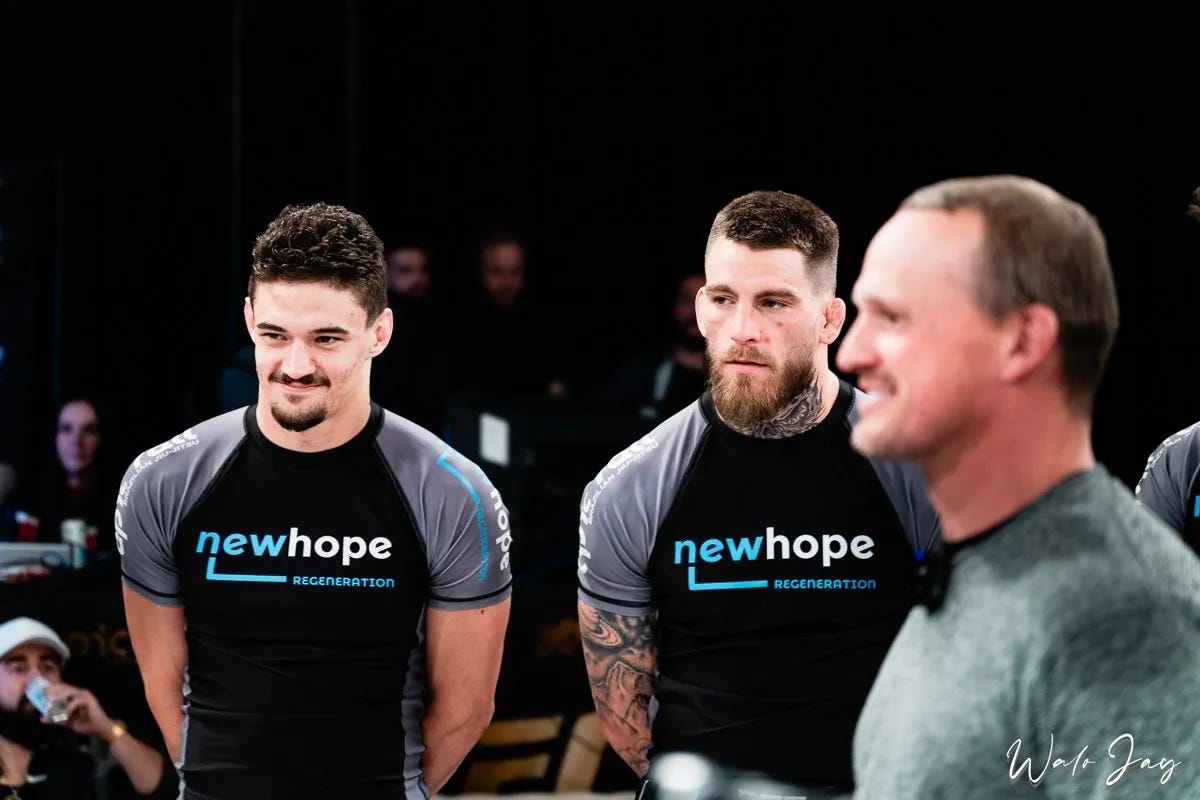
PGF stats aren’t well kept, but I’d wager we gave up the least amount of submissions a team has ever given up. After the first day, I can’t remember the team giving up more than a few.
Out of 20 main roster athletes, only half of us competed in all of our matches — it was a grueling five days.
We were the only team whose five main roster athletes stayed healthy enough to compete in all their matches. That’s not to say we had no injuries, a few of us battled through popped elbows, ankles, and every bump and bruise imaginable.
It was a dominant season by any metric.
On the fifth day, the top eight athletes, myself and Paul amongst them, entered into a single elimination bracket to compete for another $20k.
We’d landed on opposite sides of the bracket, which meant we would’ve met in the finals. It didn’t happen, I lost in the first round, and Paul by many accounts fought an uphill battle in a biased match he would’ve otherwise likely won in the semifinals after winning his first match. I hoped we’d meet in the finals, but a part of me is glad we didn’t.
Before PGF, I felt too much impostor syndrome to call myself an athlete. I did the qualifier at 205 pounds with nothing to lose, 35 pounds above my usual weight class.
When I got on the main roster, my goal was to prove to myself and to everyone else that I belonged. Five days of Deja vu in the desert, 13 matches, a team title, top eight. I now know I belong at any weight.
A few months after it was over, I got an envelope in the mail that I didn’t immediately recognize. It was a Christmas card from Ricky Lundell and his family.
I sent him a message wishing him the same, and was reminded that despite all the tangible things the PGF gave me, it’s the moments that created new friendships and strengthened old ones that will always matter most.
Today’s article was written by Ernesto Rivera. Ernesto is a BJJ black belt based out of Atlanta and an active competitor all over the world. He was recently a part of the winning team of PGF season 7. You can follow him on Instagram or read more of his work on his blog on Medium.
Thank you for reading another edition of The Grappler’s Diary!
If you enjoyed reading this article, share it with friends! Or, click on the ❤️ button on this post so more people can discover it on Substack!





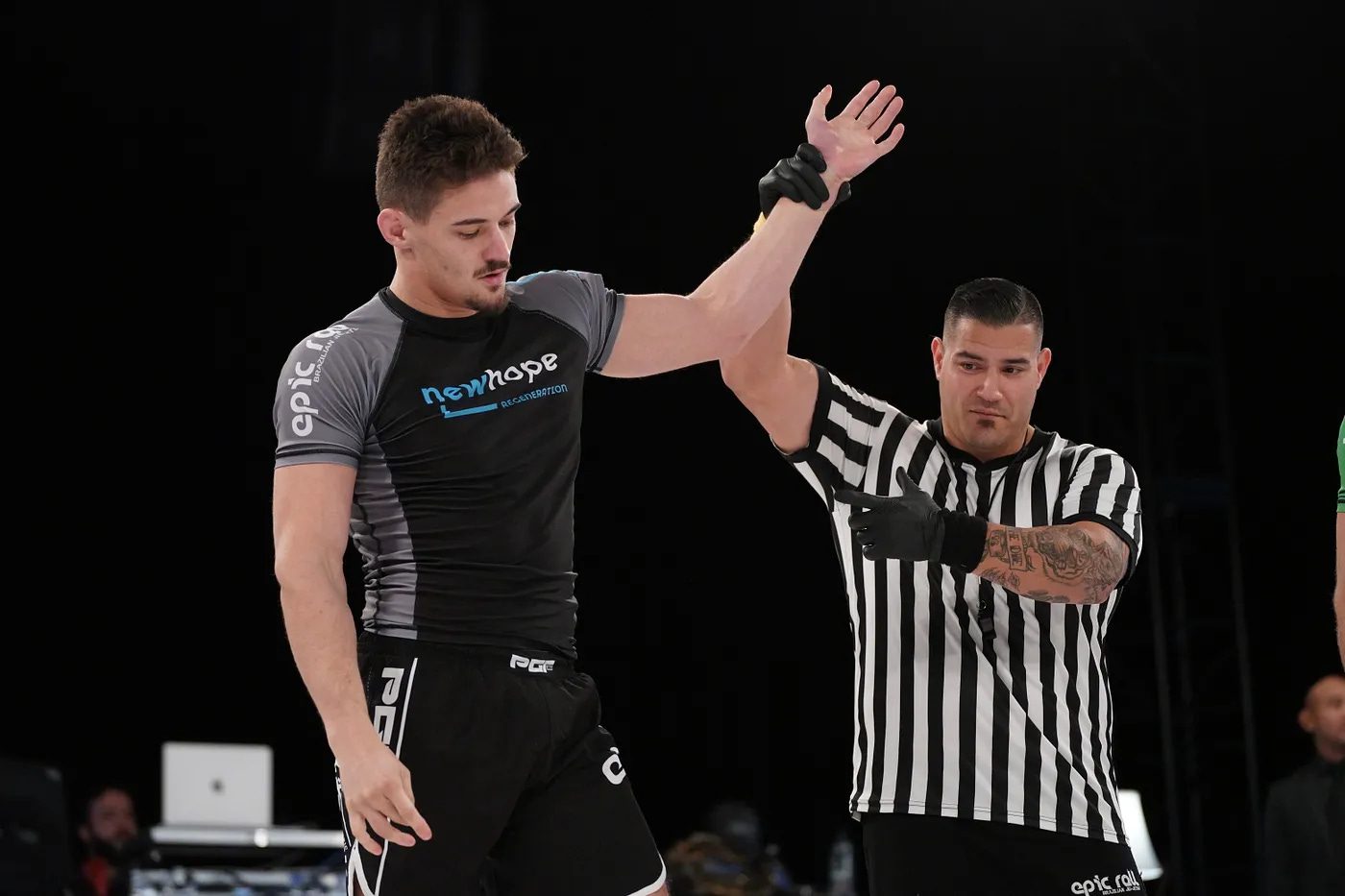
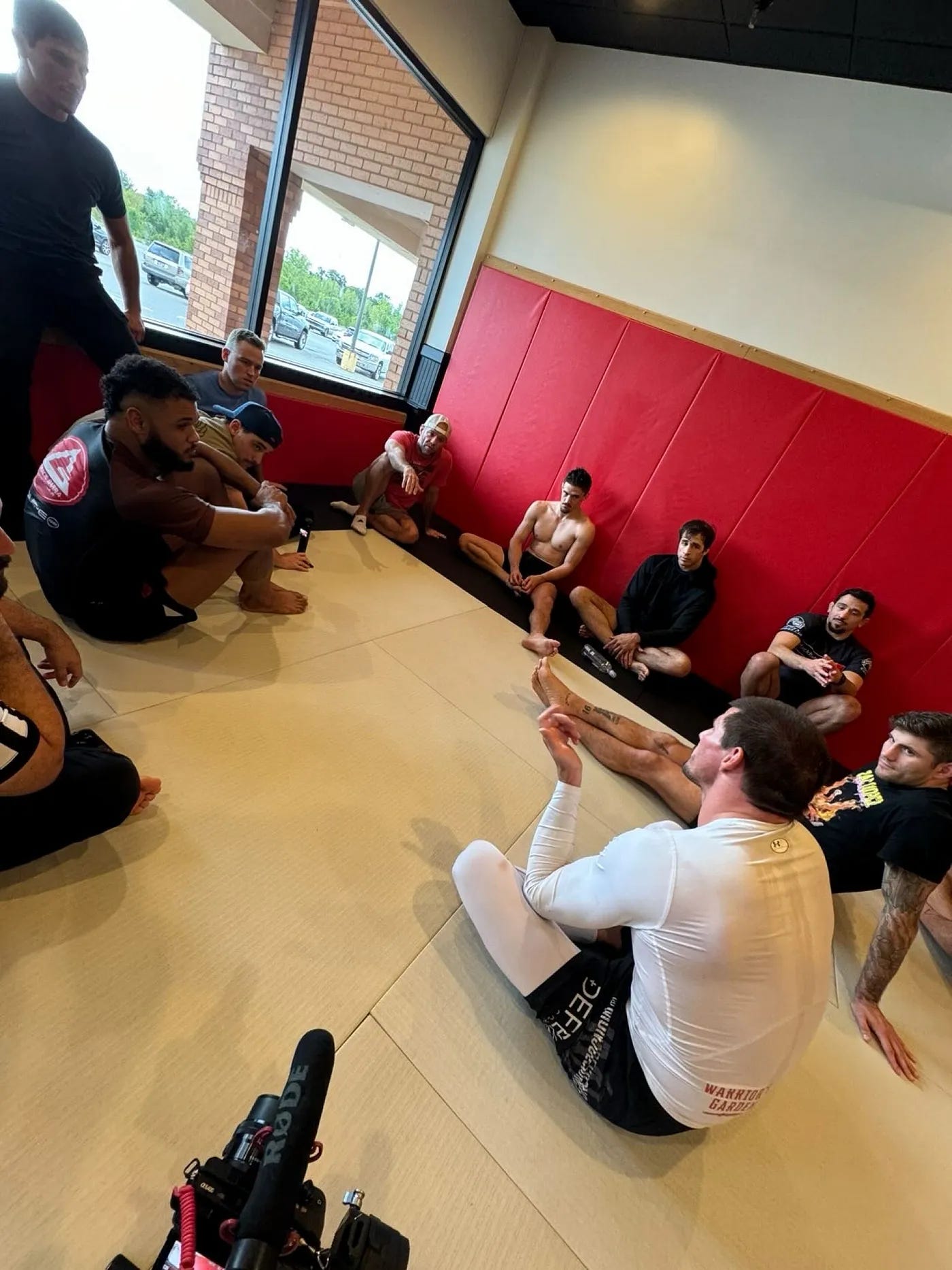
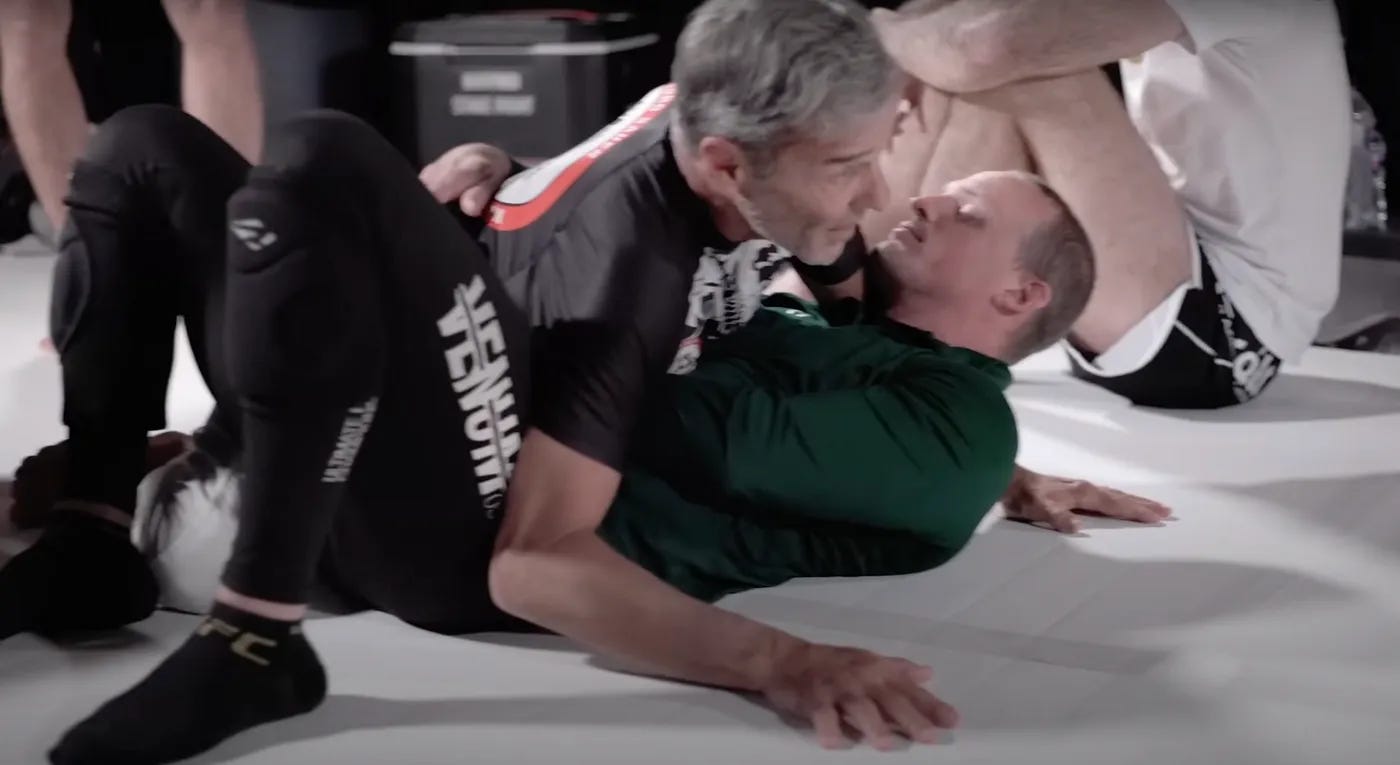
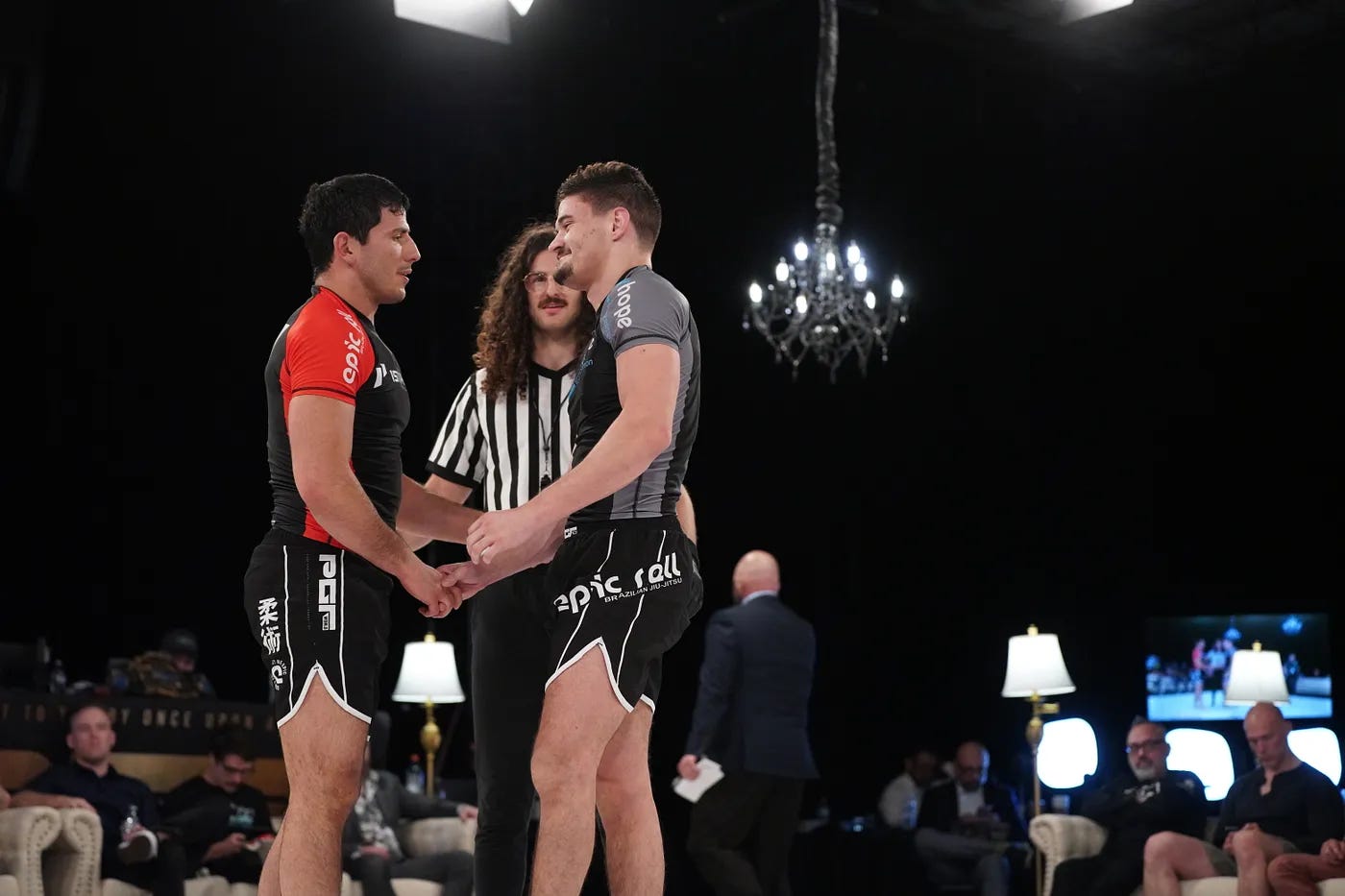
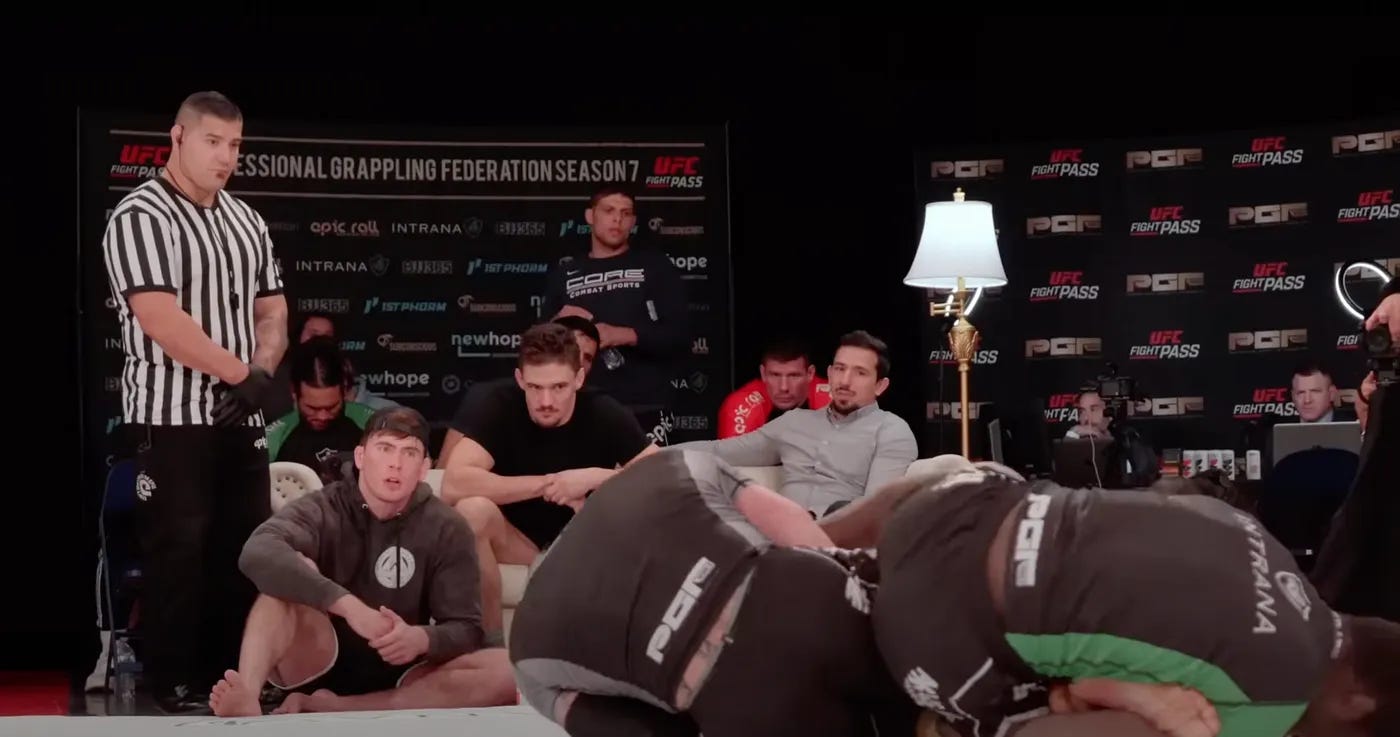

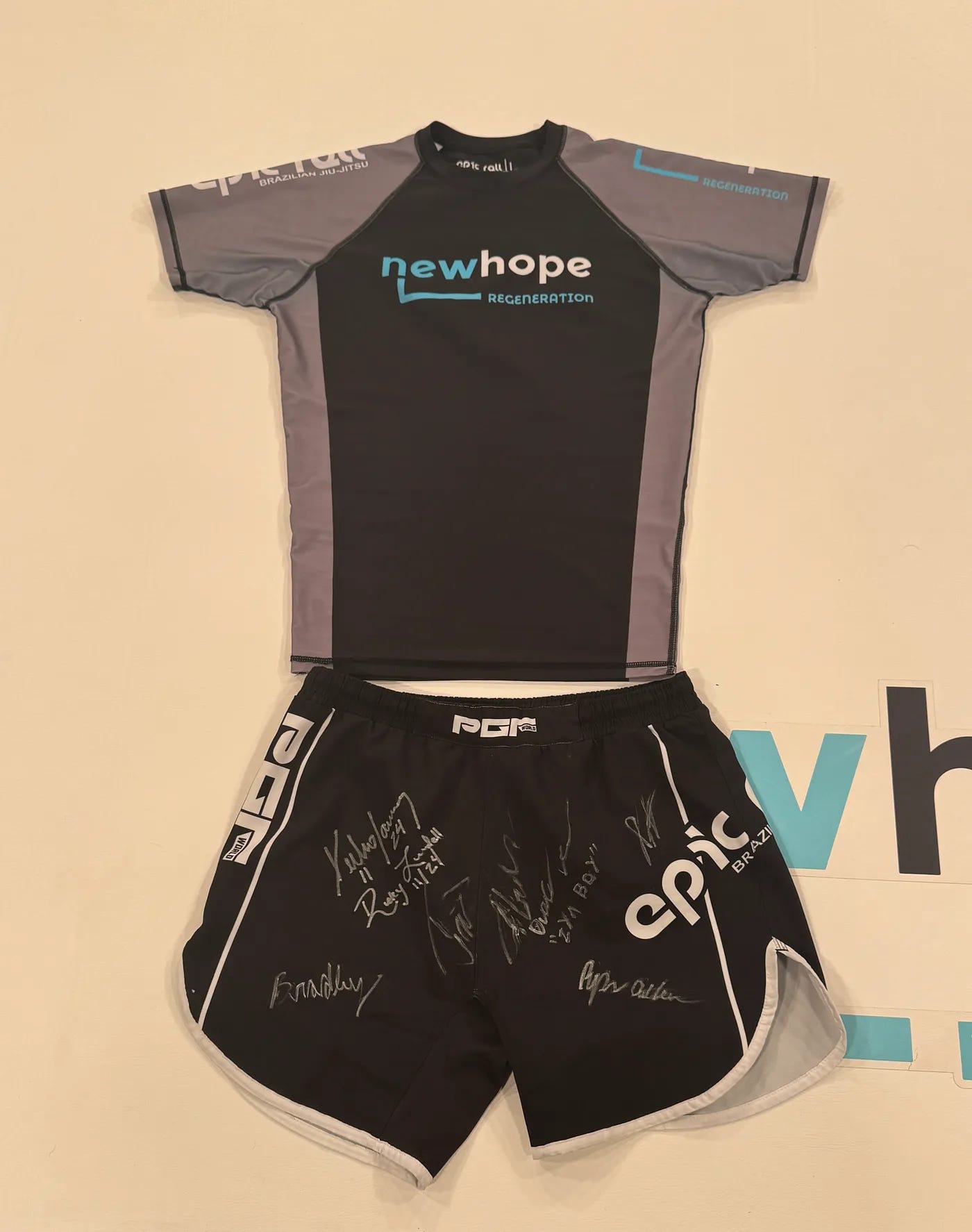
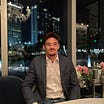
Man… get that man on Substack. Great article